Samsung Galaxy Nexus & Ice Cream Sandwich Review
by Brian Klug & Anand Lal Shimpi on January 18, 2012 1:34 PM ESTBattery life remains the other big axis on which smartphones are judged, and here we've turned to our regular 2011 suite of battery life tests to see how the Galaxy Nexus shakes out. Our battery life testing consists of a page loading suite which loads through a few dozen pages endlessly on both WiFi and cellular data until the phone dies, with the display set at 200 nits. For the cellular tests, we're always careful to test in cellular environments with decent signal (at least -75 dBm or higher) as well, since that's a factor. Next is a simple call test where we play music at both ends of a call until the device under test dies, and our final test is a WiFi hotspot workload which consists of four page loading tabs and a 128 kbps streaming MP3 station that runs until the phone dies.
First up are the web browsing tests over cellular 3G; this means EVDO Rev.A for the CDMA/LTE version, and WCDMA T-Mobile for the GSM/UMTS device.
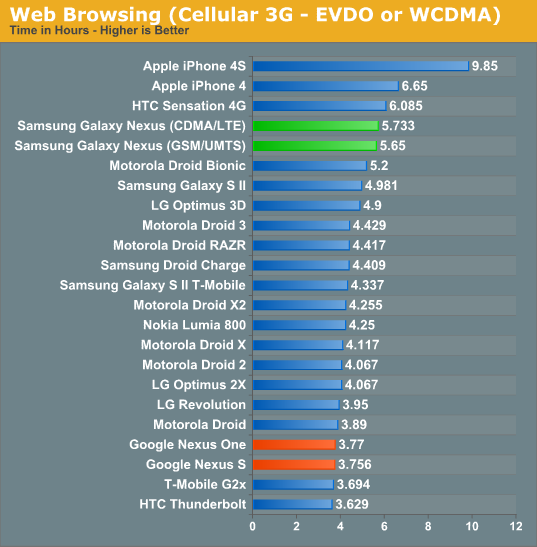
The Galaxy Nexii both do surprisingly well. I'm actually very impressed with how long the devices lasted subjectively on 3G and this definitely backs that up. Of course, both devices include beefy batteries, but Samsung has done a nice job thus far including big batteries without making devices bulky or heavy.
Next up is the same test, but on 4G LTE for the CDMA/LTE variant.
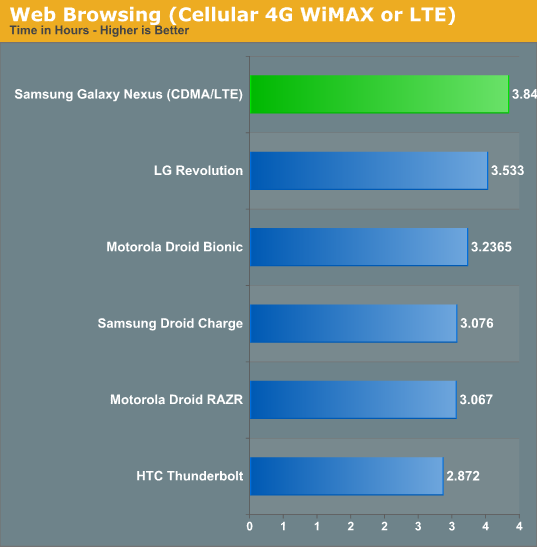
The Galaxy Nexus doesn't post numbers very far in front, but manages to come in the top of the pack on 4G LTE at just under 4 hours. This is a pretty impressive result, honestly, considering that CMC221 is likely made on the same 45nm manufacturing process as CMC220. Again, I'm impressed with the Galaxy Nexus' longevity even on 4G LTE.
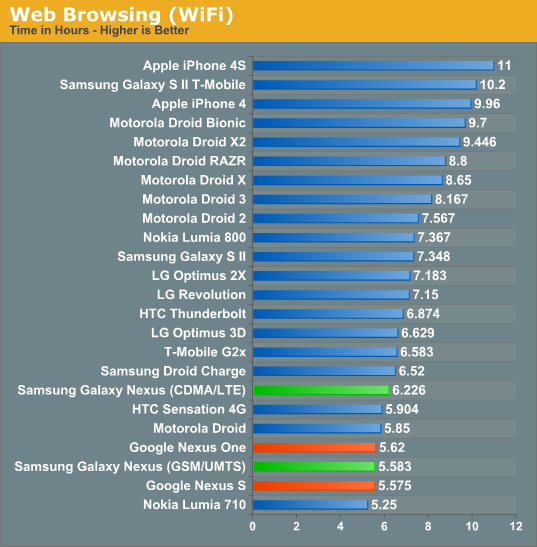
Surprisingly, the Galaxy Nexus can't break past that 6 hour mark even on WiFi, however, which does lead me to think we might be constrained by driving that display.
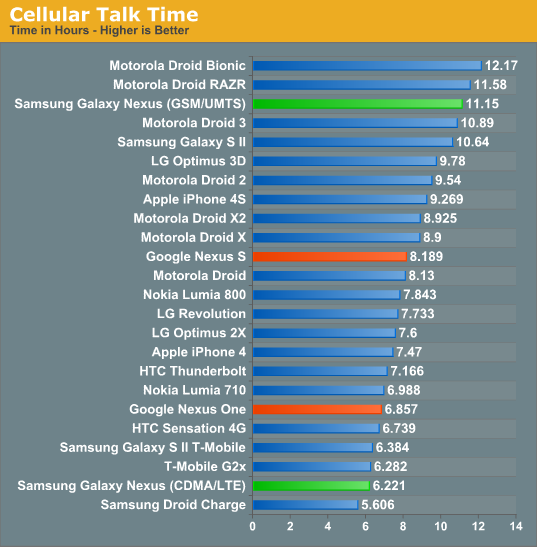
If you ever wanted to see how much difference having a different cellular architecture makes, see above. The GSM/UMTS Galaxy Nexus lasts impressively long on a voice call, at over 11 hours, yet its CDMA/LTE brother lasts just over half that.
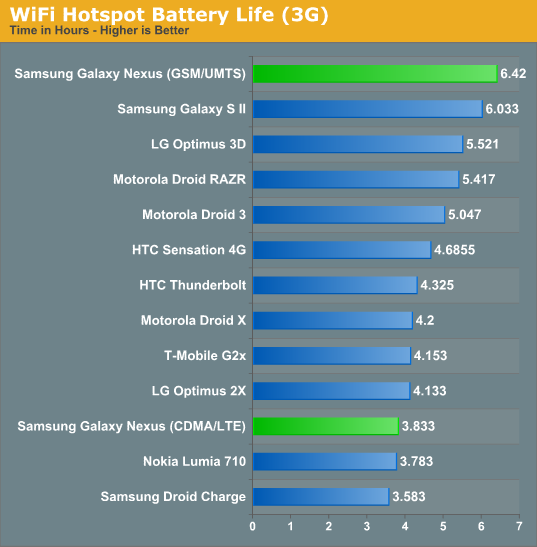
WiFi hotspot on 3G tells the same story - I'm not sure what Via Telecom's CBP7.1 draws in its active state for EVDO or 1x voice, but it seems to eat up more power than the XMM 6260 (X-Gold 626) in the GSM/UMTS Galaxy Nexus.
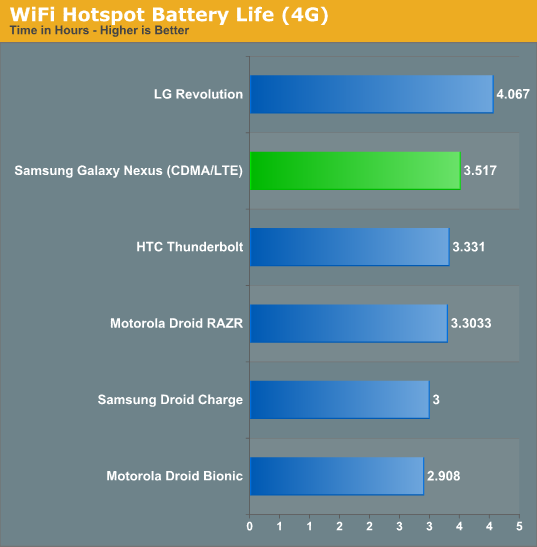
As a 4G LTE WiFi hotspot, the Galaxy Nexus loses its edge over the Revolution, but does come in just ahead of the rest of the 4G LTE herd.
The story of battery life on the Galaxy Nexus unsurprisingly depends on which variant you're talking about. For a phone with a 4.65" display, I'd say I'm impressed with the battery life on both devices - remember that the area that needs to get lit up goes as r^2 - increasing that and not killing the battery is a big feat. In addition, I'd wager that using the OpenGL ES renderpath (and accelerated browser in 4.0) definitely helped both Galaxy Nexus devices post impressive scores. As for the two variants, the GSM/UMTS device has impressively long battery life pretty much across the board. Playing with that phone, I was rarely wanting for more on my regular use schedule (I charge at night on my nightstand). We've seen XMM6260 before in numerous devices where it seems to be a pretty good citizen.
The CDMA/LTE variant, on the other hand, depends strongly on what air interface you end up using most - on 4G LTE the device comes in at the front of the pack usually, and its 3G web browsing test is above average. However, if you make a lot of voice calls, the phone might not cut it. Unsurprisingly the CDMA/LTE Galaxy Nexus does nothing to dramatically change 4G LTE battery life - for that we're still waiting for upcoming 28nm LTE basebands.










185 Comments
View All Comments
bjacobson - Wednesday, January 18, 2012 - link
I believe most of the readership is willing to wait--it's the price we pay for the most analytical reviews the net has to offer, and I definitely hope AT doesn't take a page from Tom's Hardware's book... That said, this one does seem a bit delayed, poor Anand has too much to do...dwang - Wednesday, January 18, 2012 - link
Any remaining lag issues in ics is due to software and not hardware.4.0.3 has significant performance enhancements that address any remaining lag issues in the browser and buttons.
For example, theverge.com lags pretty badly in 4.0.1/4.0.2, but is buttery smooth in 4.0.3. Check out this youtube video.
http://www.youtube.com/watch?v=IN27yZQWfU0
Either wait for google to push out 4.0.3 to the galaxy nexus or install one of the many custom 4.0.3 roms from xda.
http://forum.xda-developers.com/forumdisplay.php?f...
cgalyon - Wednesday, January 18, 2012 - link
I've noticed popping and static coming from my GNexus when using apps (such as AmbiSciPS) that include extremely low tones (like 1.05Hz). I never had this problem with my Droid X, so I'm wondering if this is a limitation of the GNexus in general or if maybe I'm having bad luck. I don't suppose there's a way you could test the ability of the phone to produce tones across a broad range of frequencies?bjacobson - Wednesday, January 18, 2012 - link
considering 1hz is 6hz below the threshold of human hearing (7hz), 19hz below what most headphones support (20hz), and about 80hz below what perfect-pitch musicians could identify as do, rei, me, fah, so, lah, or ti, I think you're asking a bit much...gorash - Wednesday, January 18, 2012 - link
I hope Android becomes a full-fledged desktop OS pretty soon, and it would be interesting to see how iOS will pan out in a few years.We're ready to say GOODBYE to Windows hegemony.
Zoomer - Thursday, January 19, 2012 - link
No thanks, that would suck badly.sjankis630 - Wednesday, January 18, 2012 - link
I have the Galaxy Nexus and while I love it, I am coming from the Droid Eris, I have noticed several picture heavy sites which cause stuttering while zooming. I was slightly taken aback. I don't care how well my phone does against some other phone in a contest. I do, however, mind when visiting some sites makes it kind of annoying trying to get around.2 particular problem sites for me are : www.theverge.com and www.msnbc.com
Lovely phone though.
dwang - Wednesday, January 18, 2012 - link
wait for 4.0.3 that addresses the browser lag issues.Here is 4.0.3 on theverge.com
http://www.youtube.com/watch?v=IN27yZQWfU0
notext - Wednesday, January 18, 2012 - link
love my nexus even though I dropped it and put a big ass crack on the screen. dropped my iphone many times and it never had a problem. Hopefully it was just a bad hit and not a sign of its design.notext - Wednesday, January 18, 2012 - link
and i will send you my broken glass once I can get a replacement. The closest repair place here in austin said it is unavailabe right now.